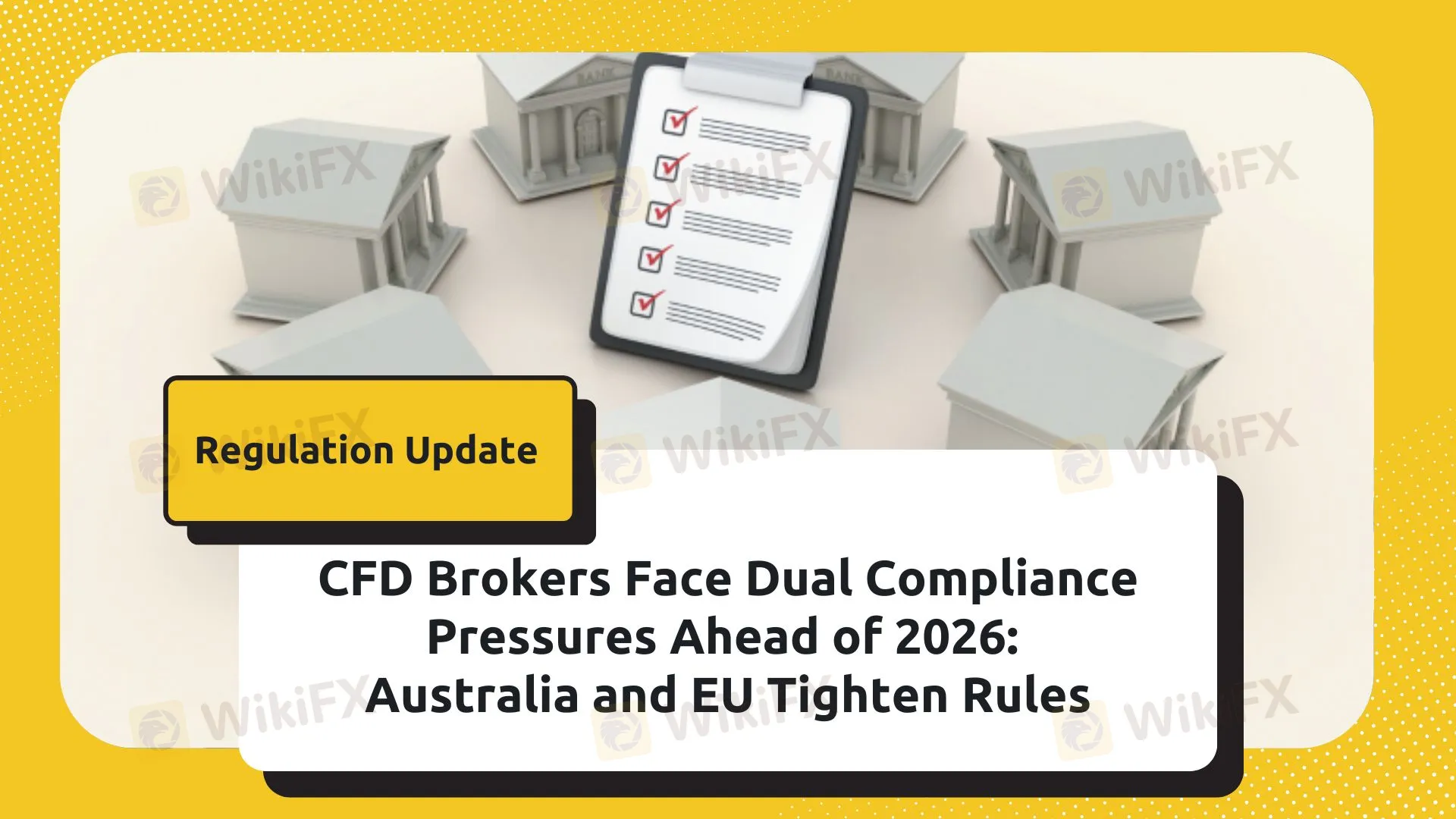CFD Brokers Face Dual Compliance Pressures Ahead of 2026: Australia and EU Tighten Rules
Abstract:CFD brokers are under increasing regulatory pressure as Australia and the EU introduce stricter rules. ASIC’s 2026 deadline requires updated adviser qualifications, while the EU Accessibility Act mandates inclusive digital design. Firms must act now to remain compliant and competitive.

As the global regulatory landscape shifts, CFD brokers operating across Australia and the European Union are under mounting pressure to adapt. Two upcoming changes—ASIC‘s 2026 qualification deadline and the EU’s Accessibility Act—are poised to reshape how brokers manage compliance and digital infrastructure.
Australia‘s ASIC Sets 2026 Deadline for Adviser Qualification
For brokers licensed under Australia’s AFS regime, the countdown has begun. The Australian Securities and Investments Commission (ASIC) will enforce new educational standards for financial advisers by January 2026. All CFD brokers must ensure their representatives meet updated qualifications, or risk regulatory action.
This rule targets both new advisers entering the industry and current staff who must upgrade credentials. ASIC also emphasizes record accuracy, urging firms to audit adviser data and address inconsistencies proactively. Delays could lead to licence complications, compliance breaches, or customer complaints.
EUs Accessibility Act Demands Inclusive Digital Platforms
In the European Union, a separate regulation is reshaping the expectations for fintech platforms: the EU Accessibility Act (EAA). Effective from mid-2025, this law mandates that all digital services—particularly those targeting EU retail clients—must be fully accessible to users with disabilities.
For CFD brokers, this means redesigning login interfaces, dashboards, educational content, and payment flows to meet inclusive standards. Accessibility is no longer a design afterthought; its now a regulatory requirement with enforcement implications. Platforms that fail to comply risk fines, legal disputes, and reputational harm in key EU markets like Germany, France, and Spain.
User Protection Now at the Forefront of EU Scrutiny
Adding urgency, Frances financial regulator AMF recently released a survey showing widespread dissatisfaction with CFD trading platforms. Complaints ranged from poorly displayed risk warnings and hidden fees to hard-to-navigate user interfaces. Brokers seeking to build trust in EU markets must now align their services with both accessibility and transparency standards.
These findings further suggest that accessibility is not just about legal compliance but also about improving customer experience and conversion rates—both crucial metrics for long-term SEO and brand performance.
Conclusion
Whether in Australia or the EU, 2026 marks a critical juncture for CFD brokers. Regulatory compliance is no longer limited to product disclosures or capital requirements. Today, firms must also demonstrate digital inclusivity, adviser professionalism, and ethical platform design.
Read more

Investing Capital in Focus as Complaints on Withdrawal and Other Issues Mount
Explore this guide we have exposed Investing Capital, which has mounted concerns for traders by disallowing withdrawals and making them lose their hard-earned money.

Global Brokers Vs. Indian Rules: Why They Struggle in India
RBI issued a warning last year against 75 forex brokers. Those brokers are globally popular and regulated in other countries, but they are banned in India. Only few brokers even have physical offices located in India. So, why do global brokers face so many challenges in entering the Indian market?

Aetos: A Closer Look at Its Licenses
With multiple regulatory entries and one license now revoked, Aetos stands as a broker requiring closer scrutiny from investors, particularly those prioritizing license scope and jurisdictional compliance.

APX Prime: No Regulation, No Withdrawals? A Closer Look at the Red Flags
With no valid license, a questionable registration in Saint Vincent and the Grenadines, and unresolved client complaints, APX Prime presents risks that traders cannot afford to ignore.
WikiFX Broker
Latest News
Elon Musk's xAI raises $10 billion in debt and equity as it steps up challenge to OpenAI
European Central Bank's tightening cycle is done,' chief economist says
ACY Securities Expands Crypto CFD Offering with 24/7 Trading Access
Revelation: Makeup Artist, Social Media Influencer Involved in INR 1.62 Cr Forex Trading Scam
Social Trading Goes Mobile at M4Markets
Capital.com Strengthens UK FinTech Ties with Key Memberships
Crypto Craze Fizzling Out? Here is Why
10-year Treasury yield ticks higher as investors eye jobs report
Public companies bought more bitcoin than ETFs did for the third quarter in a row
Tokenized Stocks: Innovation or Just Another Wrapper?
Rate Calc
